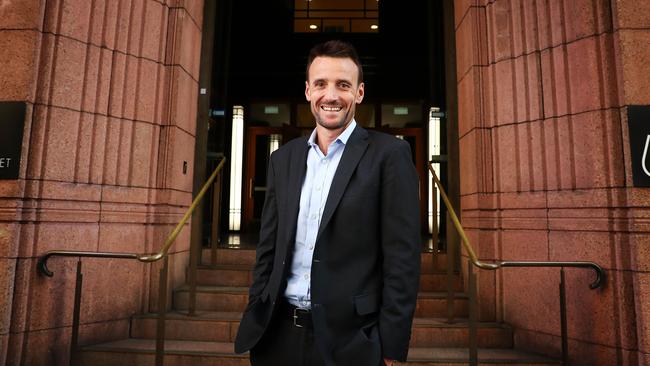Forager Funds boss Steve Johnson foraging for bargains
Look long term and avoid trend-based investing, says Forager Funds boss Steve Johnson.

A former publisher at Intelligent Investor and investment banker at Macquarie, Steve Johnson is chief investment officer at Forager Funds, which he founded in 2009. Forager has almost $400 million in funds under management and invests in the local and overseas sharemarkets.
How has Forager fared this year so far?
It’s been a good year in a blunt market. The first half was excellent but the second half has lagged the market in both our funds. Where are we going? That depends on the market (laughs). We’re holding a lot of cash in both portfolios. The average is 10-20 per cent and we’re above 30 in both funds. If we continue with a very strong bull market, it’s likely we’ll underperform that. We’re hoping for a bit more volatility and uncertainty, which will create more opportunities for us.
Are there any parts of the market you wouldn’t want to touch at the moment?
We don’t do trend-based investing. You wouldn’t see us investing in lithium or electric vehicles or artificial intelligence or any of the other hot themes out there. They tend to be a bit of a recipe for disaster. Outside of that, I would say no.
One of the challenges of the market at the moment is it’s fairly rationally valued across the board. Two years ago, parts of the market were expensive but mining and mining services were cheap. For most of the past eight years, we’ve had pockets of distress in a market which wasn’t really distressed overall. I don’t think we have those pockets at the moment, which is a challenge for value investors like us.
Do you have any mining stocks?
We have some investments in oil and oil services. Some in mining services but not actually in mining itself. We owned South32 up until Christmas last year. We don’t think mining stocks are cheap. The share prices are getting a little ahead of the long-term fundamentals. They’re difficult businesses which don’t throw off a lot of cash flow and it’s difficult to predict their future.
Are tech stocks important to you?
Forager has stocks in Alphabet, Google’s parent company. We own a few, more predictable, tech businesses with proven business models that are profitable and we can value that cash-flow strength. There’s GBST in our domestic portfolio; Alphabet and some smaller tech companies in our global portfolio. I’m reasonably optimistic about this space.
There are a lot of people talking a bubble in tech stocks. I think what you’re seeing, for the most part, is a rational analysis of how much of the world’s business these companies are taking. About 80 per cent of the growth in online advertising is being taken by Google and Facebook. It doesn’t seem to be letting up anytime soon. So you look at an Alphabet and it’s trading at 20 times earnings; there’s a very fundamental business case for those businesses trading where they are.
Is the fintech space a different kettle of fish?
The fintech craze is risky and most people who invested money there are going to lose it. There’s a big difference between speculative tech and some of these entrenched businesses which are very profitable. It’s no different to any other business: you look for competitive advantage, you look for a big market which the company can grow in, and you look for a company that can grow without a lot of capital expenditure. You look at a lot of these fintech stocks and you don’t have the answers to those questions.
How much funds does Forager have under management?
The business is about $360m at the moment. So that’s $175m in international and $190m in domestic equities. And we think that’s our capacity limit in Australia. We don’t want to expand our funds under management in that space. Internationally, we think we can grow quite a bit further from here.
What’s the best call you’ve made as CIO at Forager?
Our absolute best call as a business has been being clear, transparent, and attracting the right kind of investors. The problem in funds management is a misalignment between what investors expect and what fund managers can actually deliver. We are fanatical in ensuring investors have a five-year investment horizon.
In terms of a stock, Service Stream has been the biggest contributor to our domestic portfolio. It’s a good example of the kind of investing we do. It was in the dog’s box back in 2013. It had disappointed sorely and a lot of people were calling it uninvestable. They went through a restructure and rose a bit of capital, and the share price speaks for itself. It’s gone from 20c to $1.40 in four years.
What’s the worst call you’ve made?
We’ve had a couple of wipe-outs in the mining services space: Brierty and Hughes Drilling, which went bust. We underestimated the challenges those companies faced.
Why have ETFs been so popular lately? Do you back them?
I’m a huge fan of them. Most large-cap funds are delivering you index results pre-fees, and they’re charging you a lot of fees to do that. Index funds are a logical substitute for those expensive, large- cap fund managers. The trend is not going away. I encourage a lot of our customers to use us in conjunction with ETFs. You want to keep your costs low and then you only pay funds on things where a fund manager does something different.
How did you get into investing?
I grew up in a small town called Wellington in the middle of nowhere, but I had a mate at high school who was a Warren Buffett fan. He introduced me to investing and we got involved in the ASX shareholder game. I’ve been investing ever since. My first big investment was a cotton farming stock called Tandou, which was recently delisted and a pretty woeful investment.
Your own investments?
I am 100 per cent invested in our two funds. I don’t own a house. I don’t own any assets outside the business.



